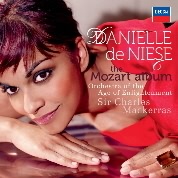That the gorgeous Danielle de Niese is a creature of the theater with a brain and a fascinating timbre is pretty clear by now. Anyone who has seen her live can only marvel at how comfortable she is moving, acting, pouting, dancing, singing, laughing, crying–indeed, interpreting. And if truth be told, every word she sings is imbued with meaning and she’s perfectly visible, even on audio recordings. She sings with more “face” than anyone since Tito Gobbi. If the world were looking for a cross between Halle Berry and Elisabeth Schwarzkopf, she would be it.
To hear her launch into “Exsultate jubilate”, which opens this new CD of Mozart arias led by the indomitable Charles Mackerras with the Orchestra of the Age of Enlightenment (superb throughout), is to think that the singer is actually an impassioned believer, inviting us, like a fiery evangelist, to delight in the Lord. The second movement, taken more quickly than usual and describing light overtaking darkness “for the just”, is similarly articulated; it makes you want to shout “hallelujah!” Which, as we know, is what comes soon–a starburst of notes, mostly perfectly placed, with runs accurate without being Bartoli-like flawless, with even a bit of embellishment near the end (“too few notes, my dear Mozart”), a trill that doesn’t quite click, and a ravingly fine high-C to top it all off. This is the most “personal” “Exsultate” I have ever heard, but I’m not certain that’s what I’m looking for.
“Bella mia fiamma”, a tragic, hand-to-forehead farewell that is more suited to such extravagant emotion, follows and it sweeps the listener up in a similar fashion. After the weepy recitative–overdone, to my ears–the mood swings are vivid and riveting, the maniacal finale just that. The inherent duskiness in de Niese’s tone is most welcome here, but she is recorded so closely and her interpretation so intense that there are moments of feeling assaulted.
Technically, de Niese is absolutely up to the challenge of this difficult work, remaining constantly on pitch even in the most bizarre chromatic moments. But re-hearing Soile Isokoski (on Ondine), certainly one of the least sensuous singers alive, singing the same aria, is less imposing but simply better–more Mozartean, more musical, and with more interesting emphases.
Susanna’s alternate aria (K. 577) for the last act of Figaro certainly lets us know how strong this character is, but she comes across as more desperate than necessary. Listening to Bartoli’s 1994 recording (Mozart Portraits, on Decca), you get the sense of young disappointment, with plenty of shading, pianissimo singing, and then a glorious change of mood for the expression of passion. Early on, de Niese over-emphasizes the chest voice on the last syllable of the word “moriro”; the tragedy is too deep for this Susanna’s character. Bartoli is far more understated and makes the greater effect.
On the other hand, the brief “Ah! fuggi il traditor”, delivered with the same forward thrust and energy, is perfect–Donna Elvira is in de Niese’s soul. The 10-year-old composer’s “Oh, temerario Arbace!…Per questo paterno amplesso” is gorgeously sung and felt, the sadness clear and touching. De Niese does not have the purity of tone I prefer for “L’amero saro costante”; there’s too much of a grain in her sound. Compare to Maria Stader, Elisabeth Schwarzkopf, and Emma Kirkby.
A quick “La ci darem la mano” with Bryn Terfel as a sweet-talking but insistent Don brings out a great Zerlina from de Niese, with the voice scaled back deliciously and no mugging. The recital closes with the Laudate Dominum from K. 339, and it’s a beauty, exquisitely phrased, evenly produced from top to bottom, and gentle as a lamb.
As a fan of de Niese–I praised the Handel album and almost fell all over myself with her Glyndebourne Cleopatra–I’m upset with my reaction to this disc. I’ve tried to pinpoint the problems, but in general, she’s singing too aggressively, leaning on the voice too much. I normally hate sopranos who refuse to do precisely this, but de Niese is sacrificing limpidness of tone for drama–some of which is ersatz and more suited to verismo. So much of Mozart merely has to be sung rather than underlined, and it seems as if this is a lesson to be learned. Mozart does almost all of the work; de Niese is impressing too much on each note. She is an important artist, perhaps over-thinking. A creature of the theater, indeed, but not every theater is the Palladium or Madison Square Garden. Calm down, Danielle–you’ve got it all. [9/8/2009]
































